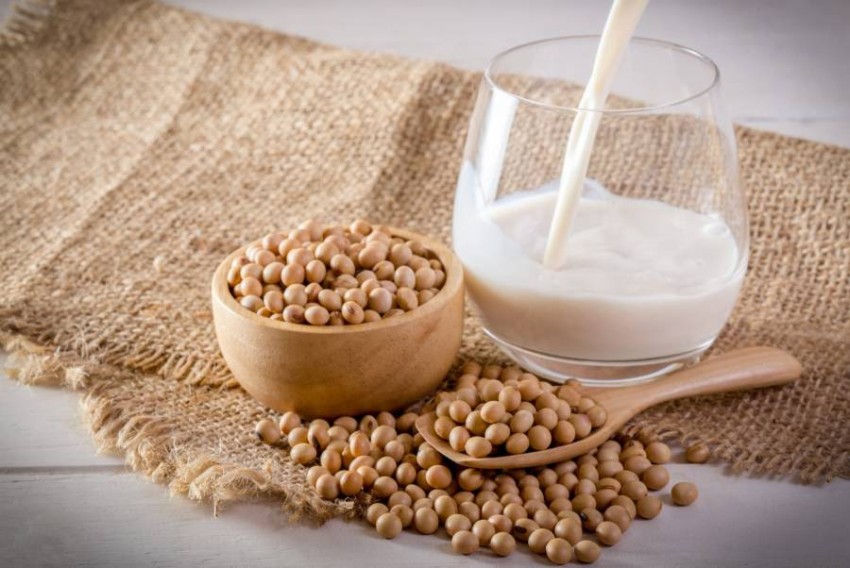The benefits of soy milk .. How do you choose the best for you?
Soy milk is one of the most popular plant-based dairy products worldwide, and the market value in 2025 is expected to reach about $ 23.2 billion, which is a significant increase over the market value of $ 15.33 billion in 2018, according to a trend report issued by Statista. German.
Consumers access soy milk for a variety of reasons / but how does it compare to dairy milk and other vegan alternatives? Could soy milk be harmful to you?
What is soy milk and how is it made?
Soy milk is a dairy-free vegan beverage that is often consumed as a substitute for milk, and it is made from soybeans, and contains vitamins and minerals such as vitamin D and calcium in addition to omega-3 and flavonoids that exert antioxidant, anti-inflammatory, and cardioprotective properties.
Soy milk is made by soaking and grinding the grains and then boiling in a liquid, filtered to remove any remaining particles, and then packed.
The nutritional value of soy milk
One cup (244 grams) of unsweetened soy milk contains the following nutrients:
Calories: 105
Protein: 6.3 grams (13% of the recommended daily value)
Fat: 3.6 g (5% of the recommended daily value)
Sodium: 115 mg (5% of the recommended daily value)
Carbohydrates: 12 g (4% of the recommended daily value)
Fiber: 0.4 g (2% of the recommended daily value)
Vitamin D: 2.7 micrograms (13% of the recommended daily value)
Calcium: 300 mg (23% of the recommended daily value)
Iron: 1 mg (6% of the recommended daily value)
Potassium: 298 mg (6% of the recommended daily value)
How does soy milk compare to other plant-based milks?
Based on nutritional value alone, soy milk outperforms other plant-based milks, and makes it comparable to low-fat cow's milk when looking at total calories, protein, vitamins, and mineral content such as calcium and vitamin D.
Fortified soy milk can help you meet vitamin B-12 requirements, and this is ideal for people who follow a vegan meal plan, which often lacks these essential nutrients, and soy milk is a strength of plant protein, providing 7 grams of protein per cup. And it is not just the amount of protein that makes soy milk better nutritionally, but the quality too.
Soy is a complete protein, containing all 9 essential amino acids, and the body needs these to synthesize its protein supply.
The benefits of soy milk
The vitamins, minerals, and antioxidants in soy milk can provide important health benefits, and the forms of vitamin B found in soy milk are important to help your body maintain nerve cells and DNA, and they can also help you avoid certain forms of anemia, which can prevent fatigue. Fatigue, in addition, soy milk can provide other health benefits such as:
1. Brain health
Soy milk is rich in omega-3 fatty acids, which are healthy fats your body cannot make on its own. Omega-3 fatty acids are linked to a reduced risk of dementia and Alzheimer's disease.
Soy milk is still being studied for its effect on these diseases, but soybeans in general are one of the best non-animal sources of omega-3 fatty acids.
2. Improve heart health
Soy milk can also help support the cardiovascular system. Soy milk is an excellent source of potassium, and it is associated with maintaining low blood pressure and a regular pulse. Soy milk has also been linked to lower cholesterol levels, especially in people with high cholesterol.
3. Decrease in menopausal symptoms
Soy milk contains isoflavones, a class of chemicals known as phytoestrogens. This substance reacts in the body like a weak form of the hormone estrogen. This is why studies have shown that consuming soy milk and other soy products may help reduce symptoms of menopause.
4. Feeding
Most of the soy milk on the market is fortified with added nutrients. This makes fortified soy milk a great source of calcium and is the most common mineral in the body. Consuming enough calcium can help strengthen your bones and reduce the risk of osteoporosis.
Soy milk is also an excellent source of:
Vitamin A
Vitamin B.
Potassium
Calcium
Retinol
Folic acid
Choline
Is soy milk harmful?
Although adding plant-based milk such as soy milk to your diet can provide many health benefits, there is a major downside:
Soy is an allergen, which means that there is a large group of people who cannot drink soy milk, and if you have a soy allergy, all is not lost.
Although you will need to avoid all soybeans in the diet (including soy milk), you can still enjoy plant-based milk, and if an allergy prevents you from enjoying soy milk, try rice milk, oat milk, or cashew milk instead.
Although isoflavones in soy can act like the hormone estrogen, it does not cause breast cancer in humans, and some animal studies have suggested a link between soy and breast cancer, but research has since found no link between humans.
How to choose the best soy milk
Soy milk, just like other plant-based milks, can contain a lot of added sugars, so be sure to look for an unsweetened variety, as the word "unsweetened" on the packaging helps you with that.
Other ways to make sure you're drinking the low-sugar variant are not to buy soy milk that lists the sources of added sugar in the first three ingredients, and choose varieties with the lowest grams of added sugar as possible.
Monitor the vitamin and mineral content as well, and make sure the soy milk you choose is fortified with vitamins and minerals such as calcium, vitamin D and vitamin B12.
Source:1



